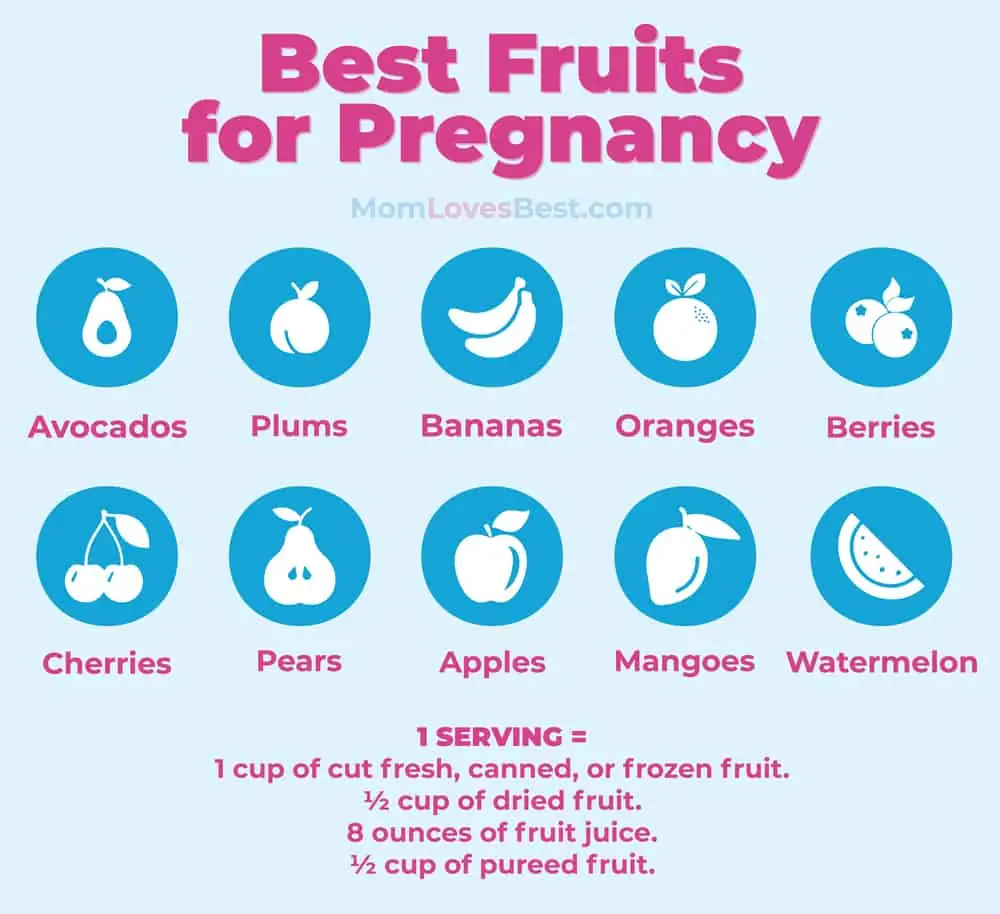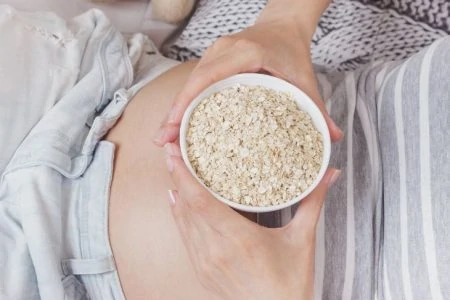You likely know fruit belongs in your daily diet, but its importance skyrockets when you are expecting. Beyond just being a sweet treat, fruit offers essential building blocks for your baby and relief for your changing body.
From curbing sweet cravings to keeping your digestion moving, the benefits are vast. However, not all produce is created equal, and there are specific safety rules you need to follow.
In this guide, we will cover why prenatal nutrition matters, the top fruits to add to your grocery list, and which ones you should limit or avoid for a safe pregnancy.
Key Takeaways
- Aim for 2 to 4 servings of fruit daily to support hydration and nutrient intake.
- Prioritize fiber-rich options like bananas, apples, berries, and avocados.
- Wash all produce thoroughly and avoid unpasteurized juices to prevent illness.
- Limit dried fruit and fruit juice to keep sugar intake in check.
The Importance of Prenatal Nutrition
Your prenatal vitamins provide a safety net, but whole foods should be your primary fuel source. Here is why prioritizing your diet matters:
- It impacts long-term health: Your diet during pregnancy influences your baby’s development and future health. Some research suggests that a diet high in sugar and unhealthy fats during pregnancy might predispose your child to similar taste preferences and weight struggles later in life (1).
- Food enhances nutrient absorption: Your body absorbs nutrients best from food sources rather than isolated supplements. For instance, the iron in spinach absorbs better when paired with vitamin C from strawberries. A balanced diet ensures these synergistic combinations happen naturally.
- It improves maternal well-being: Fruit offers more than just vitamins; it provides fiber, water, and texture. Eating nutrient-dense foods keeps your energy levels up, stabilizes your mood, and helps manage common pregnancy symptoms like fatigue and constipation.
10 Best Fruits to Eat During Pregnancy
Add these nutrient-packed options to your rotation for maximum benefits:
- Bananas: These are a pregnancy staple for a reason. Bananas are rich in potassium, which helps combat fluid retention and those painful middle-of-the-night leg cramps. They also offer a quick energy boost and are gentle on the stomach if you are battling nausea. If you have gestational diabetes, opt for greener bananas to keep sugar content lower.
- Apples: An apple a day truly helps, especially thanks to the fiber in the skin. Apples contain vitamins A and C, plus pectin, a soluble fiber that supports healthy digestion. They are portable and crunchy, making them the perfect on-the-go snack.
- Watermelon: Staying hydrated is critical, and watermelon helps you get there with its 92% water content. It is a lifesaver if you struggle with dehydration during pregnancy. It also provides vitamins A, C, and B6, along with magnesium and potassium to help relax cramping muscles.
- Oranges: This citrus fruit is famous for vitamin C, which boosts your immune system and helps your baby build strong bones and teeth. The high water content aids hydration, and the folate inside helps prevent neural tube defects. Plus, the zesty scent can often settle a queasy stomach.
- Avocados: While technically a fruit, avocados are unique because they are loaded with healthy monounsaturated fats. These fats are crucial for your baby’s brain and tissue development. Avocados also contain more potassium than bananas and are rich in folate and vitamin K.
- Berries: Strawberries, blueberries, raspberries, and blackberries are antioxidant powerhouses. They pack a punch of vitamin C, fiber, and folate while remaining lower on the glycemic index than many other fruits. This makes them an excellent choice for maintaining steady blood sugar levels.
- Pears: If constipation is getting you down, reach for a pear. They are high in fiber, specifically pectin, which keeps digestion moving smoothly. Pears also provide potassium and folate, supporting heart health for both you and your baby.
- Plums: Fresh plums are delicious, but their dried counterparts (prunes) are legendary for relieving constipation. They contain sorbitol and fiber, acting as a natural laxative. Whether fresh or dried, they are a solid addition to your diet when things feel backed up.
- Mangoes: These tropical treats are rich in vitamins A and C. Vitamin A is vital for your baby’s immune system and vision. Just keep portion sizes in mind, as mangoes are higher in natural sugar than berries or melons.
- Cherries: These little red gems are loaded with antioxidants and vitamin C. They also contain melatonin, a hormone that regulates sleep cycles. If pregnancy insomnia is keeping you up, a bowl of cherries might help you drift off easier.
Benefits of Fruit During Pregnancy
Targeting a healthy pregnancy involves smart food choices. Here is why fruit should be a priority:
- It Provides Vital Nutrients: Your growing baby demands specific resources. Fruits are the best delivery system for vitamin C (crucial for collagen and immunity) and folate (essential for preventing neural tube defects like spina bifida). Vitamin C also boosts iron absorption, helping to ward off anemia (2).
- It Satisfies Sweet Cravings: Hormones can make you crave sugar intensely. Reaching for a peach or a bowl of grapes offers natural sweetness along with fiber and vitamins, unlike a candy bar that offers empty calories and a sugar crash.
- It Soothes Nausea: Pregnancy nausea can make eating difficult. Many women find that cold, fresh fruits like melon or citrus are easier to tolerate than heavy, cooked foods. The high water content and mild flavors can be a lifesaver during the first trimester.
Another craving I had throughout pregnancy was apples. The crunch satisfied my need for a snack, and the tart, juicy flavor appealed to me even when I was going through my 20 weeks of nausea.Editor's Note:
Mary Sweeney, BSN, RN, CEN - It Helps Regulate Blood Sugar: Thanks to fiber, the sugar in whole fruit releases slowly into your bloodstream. This prevents the rapid spikes and drops associated with processed snacks. Pairing fruit with a protein source, like cheese or nuts, stabilizes your energy even further.
- It Keeps You Hydrated: Drinking plain water can get monotonous. Since many fruits are over 80% water, snacking on them contributes significantly to your daily fluid intake, keeping headaches and dizziness at bay.
- It Relieves Constipation: Digestion naturally slows down during pregnancy due to progesterone (3). Combined with iron supplements, this often leads to constipation. The fiber and water in fruit soften stools and promote regularity, helping you avoid issues like hemorrhoids.
How Much Fruit Should I Eat While Pregnant?
While fruit is nutritious, moderation is key due to the natural sugar content. Most experts recommend eating 2 to 4 servings of fruit per day.
Keep an eye on serving sizes to ensure you aren’t accidentally overindulging.
One standard serving equals:
- 1 cup of cut fresh, frozen, or canned fruit.
- 1 medium whole fruit (like an apple or banana).
- ½ cup of dried fruit.
- ½ cup of pureed fruit.
Fresh is fantastic, but frozen fruit is a reliable alternative. It is picked and frozen at peak ripeness, locking in nutrients that can sometimes degrade in fresh produce sitting on a shelf.
Are Organic Fruits Better While Pregnant?
The debate between organic and conventional produce is ongoing. However, pregnancy is a time when many women prefer to minimize exposure to synthetic pesticides. If your budget allows, choosing organic can reduce your chemical load.
If an all-organic diet isn’t feasible, use the Environmental Working Group’s “Dirty Dozen” list as a guide. These fruits tend to have higher pesticide residues, so prioritize organic for these specific items (4).
Common fruits often found on the “Dirty Dozen” list include:
- Strawberries.
- Nectarines.
- Apples.
- Grapes.
- Peaches.
- Cherries.
- Pears.
- Tomatoes.
Conversely, the “Clean Fifteen” are fruits with thicker skins or lower pesticide retention, making conventional versions safer to buy (5).
Common fruits often found on the “Clean Fifteen” list include:
- Avocados.
- Pineapples.
- Papayas.
- Mangoes.
- Honeydew melon.
- Kiwi.
- Cantaloupe.
Remember, eating conventional fruit is far better than eating no fruit at all. Simply wash all produce thoroughly under running water to remove surface residue and bacteria.
Take Note
Fruits and Products to Avoid During Pregnancy
Most fresh fruits are safe, provided they are washed well to remove bacteria like *Toxoplasma* or *Listeria*. Use a vegetable brush for firm fruits like melons and rinse softer fruits gently.
Take Note
Be mindful of these fruit-based products:
1. Fruit Juice
Juice delivers a high dose of sugar without the fiber to slow down absorption. Even “100% juice” can spike your blood sugar rapidly. Plus, you miss out on the digestive benefits of the skin and pulp.
2. Dried Fruit
Dried apricots, cranberries, and raisins are convenient, but they are calorically dense. Because the water is removed, the sugar is concentrated. It is easy to eat a handful of dried apricots (high sugar) versus three whole apricots (filling fiber and water). Eat these sparingly.
3. Canned Fruit
Canned fruit is a decent backup, but watch the label. Many brands pack fruit in “heavy syrup,” which is essentially sugar water. Always choose fruit canned in water or its own juice. Also, be aware of BPA in can linings; look for BPA-free labels or choose jarred options when possible.
4. Smoothies
Smoothies can be healthy, but they often turn into sugar bombs. Large commercial smoothies can contain more calories and sugar than a milkshake. If you make them at home, use unsweetened bases like almond milk or water, and include fats or proteins like nut butter or spinach to balance the nutrition.
FAQs
The Bottom Line
Fruit is one of the best gifts you can give your body and your baby during pregnancy. It provides the hydration, fiber, and essential vitamins necessary for a smooth nine months.
Listen to your body’s cravings, but try to steer them toward whole, fresh options rather than sugary juices or dried snacks. Whether you are snacking on a banana for leg cramps or enjoying watermelon to stay cool, you are nourishing your little one with every bite.




